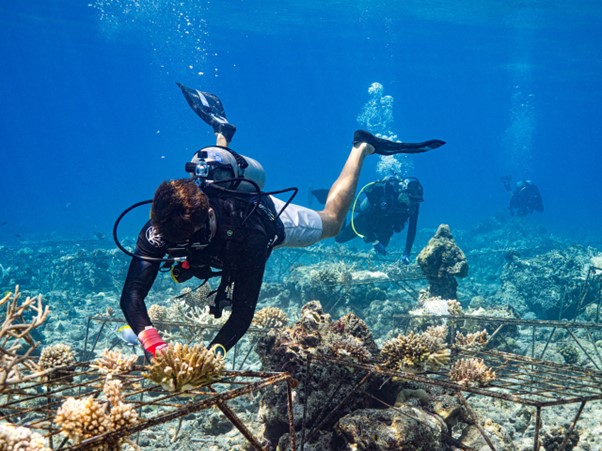
Photo courtesy: Soneva Fushi
Recognising the urgent plight of coral reefs in the Maldives and around the world, the Soneva Foundation Coral Restoration programme hosted a significant dialogue from January 9 to 12, 2025, at Soneva Fushi in the Baa Atoll UNESCO Biosphere Reserve. The event convened leading coral scientists, marine conservationists, and innovative finance experts to develop transformative solutions for reef restoration and regeneration on a global scale.
Exploring the Impact of Climate Change
The three-day Soneva Dialogue on Coral Reef Restoration and Resilience, co-facilitated by Professor Callum Roberts from the University of Exeter and Karen Sack, Executive Director of the Ocean Risk and Resilience Action Alliance (ORRAA), delved into the effects of climate change on coral ecosystems. The dialogue also highlighted groundbreaking restoration techniques being trialled at Soneva Fushi and beyond.
A Call for Swift and Large-Scale Action
The event culminated in a joint declaration emphasising the critical need for swift and large-scale action. International experts proposed innovative financial mechanisms, including blue bonds and insurance models, to unlock the necessary resources for coral reef regeneration. Without bold interventions, the world risks losing the majority of its tropical coral reefs within decades.
Expert Opinions
Professor Callum Roberts remarked, “Scientific research and practical experience tell us that now is the time for a shift in emphasis from restoration to regeneration, pairing resource-intensive local projects with large-scale ocean management and protection to promote reef recovery and resilience. Coral restoration has been largely backward-looking, aiming to put back what has been lost. It must now pivot to being future-focussed, searching for and developing mixes of corals and other marine life that will keep reefs functional and resilient under changed future conditions.”
Karen Sack of ORRAA added, “Corals are in crisis worldwide, and if we are to have any chance of saving reefs at any scale we must rapidly advance regeneration efforts. This requires the urgent scaling up of finance to fund these vital natural treasures. If we want coral reefs to survive, we are going to have to find novel ways to pay for them. The ORRAA looks forward to working with our members, partners, and the scientific community to take the ideas developed at the Soneva Dialogue forward.”
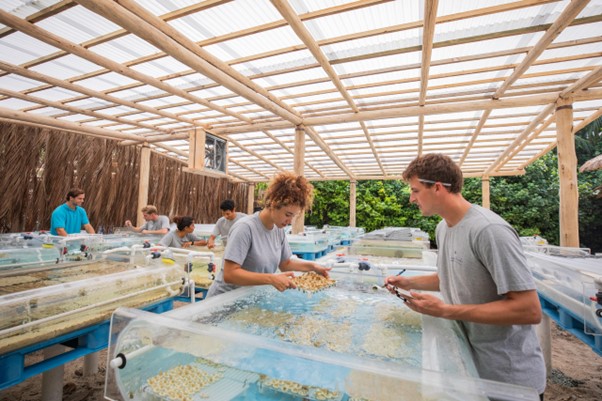
Ongoing Efforts and Future Plans
Dr Johanna Leonhardt, lead scientist of the Soneva Foundation Coral Restoration programme, commented, “As a coral biologist, I see the tragic impacts of marine heatwaves first-hand with bleaching leading to substantial coral degradation here in the Maldives. However, we are not about to give up on this paramount ecosystem – we have a coral spawning lab, outplanting efforts, and coral nurseries, and are fully focused on regenerating resilient corals so that they are not lost forever.”
The declaration from the Soneva Dialogue reaffirms that in recent years, reefs around the world have lost half their living coral cover. Failing to limit global warming to 1.5°C will accelerate this loss. However, there is hope, with the call for bold and innovative approaches to sustain reef resilience in the face of climate threats. Financing on an unprecedented scale will be vital to regenerating these invaluable ecosystems.
Looking Ahead
The Soneva Dialogue on Coral Reef Restoration and Resilience has set the stage for global cooperation and innovative solutions to preserve and regenerate coral reefs. As these efforts continue, the Soneva Foundation and its partners remain committed to protecting one of the planet’s most precious ecosystems for future generations.
 Wild Coast Tented Lodge Unveils New Nature‑Led Experiences in Yala, Elevating Luxury Safari in Sri Lanka
Wild Coast Tented Lodge Unveils New Nature‑Led Experiences in Yala, Elevating Luxury Safari in Sri Lanka 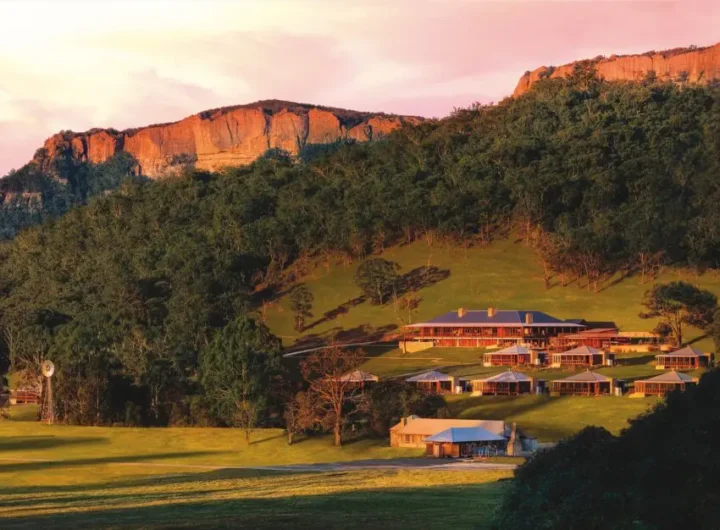 Luxury Reimagined: Emirates’ Iconic Wolgan Valley Resort Returns as the World’s First Ritz-Carlton Lodge
Luxury Reimagined: Emirates’ Iconic Wolgan Valley Resort Returns as the World’s First Ritz-Carlton Lodge  Discover Authentic Sardinia in Ogliastra: Hidden Villages & Coastline from Arbatax Park Eco Resort
Discover Authentic Sardinia in Ogliastra: Hidden Villages & Coastline from Arbatax Park Eco Resort 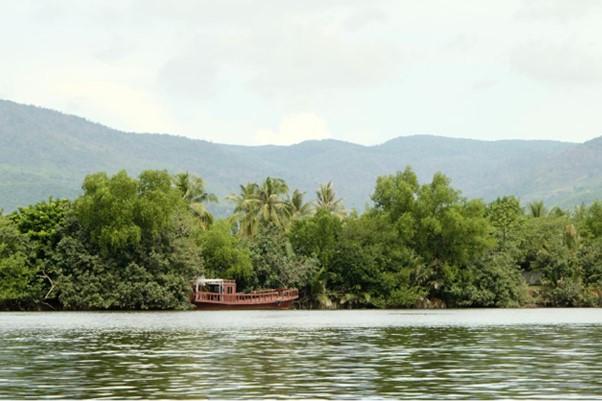 Knai Bang Chatt Launches ‘The Regenerative Stay’ to Turn 2026 Kep Holidays into Mangrove Restoration
Knai Bang Chatt Launches ‘The Regenerative Stay’ to Turn 2026 Kep Holidays into Mangrove Restoration  Nala Maldives by Jawakara Islands: New Adults-Only Luxury Resort Opens in Lhaviyani Atoll
Nala Maldives by Jawakara Islands: New Adults-Only Luxury Resort Opens in Lhaviyani Atoll 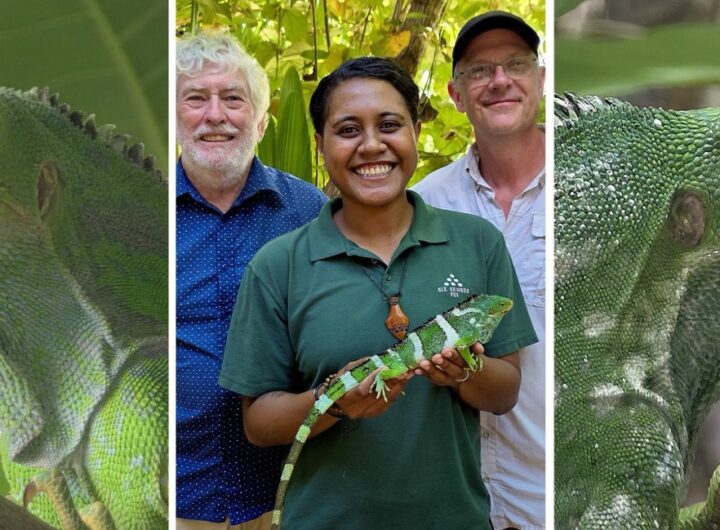 Six Senses Fiji Leads Fijian Crested Iguana Comeback with Landmark Translocation to Castaway Island
Six Senses Fiji Leads Fijian Crested Iguana Comeback with Landmark Translocation to Castaway Island  Holland America’s 2027–2028 Legendary Voyages: Deep-Discovery Cruises for Serious Explorers
Holland America’s 2027–2028 Legendary Voyages: Deep-Discovery Cruises for Serious Explorers  Explora Journeys Unveils EXPLORA III: The Next Chapter in Ultra-Luxury Ocean Voyages
Explora Journeys Unveils EXPLORA III: The Next Chapter in Ultra-Luxury Ocean Voyages  Carnival’s New Zero Proof Drink Package: What Aussie Cruisers Need to Know for 2026
Carnival’s New Zero Proof Drink Package: What Aussie Cruisers Need to Know for 2026 